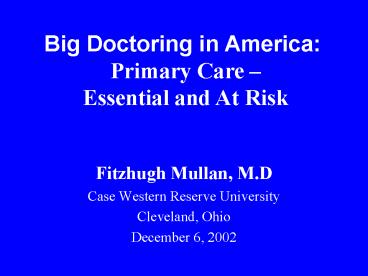Fitzhugh Mullan, M'D - PowerPoint PPT Presentation
1 / 23
Title:
Fitzhugh Mullan, M'D
Description:
Primary care is the provision of integrated, accessible health ... 1940 - The Present -- The Rise of Specialism. White et al, 1961. The History of Primary Care ... – PowerPoint PPT presentation
Number of Views:65
Avg rating:3.0/5.0
Title: Fitzhugh Mullan, M'D
1
Big Doctoring in America Primary Care
Essential and At Risk
- Fitzhugh Mullan, M.D
- Case Western Reserve University
- Cleveland, Ohio
- December 6, 2002
2
(No Transcript)
3
Primary Care Defined
- Primary care is the provision of integrated,
accessible health care services by clinicians who
are accountable for addressing a large majority
of personal health care needs, developing a
sustained partnership with patients and
practicing in the context of family and
community. - Institute of Medicine
4
Value of Primary Care
- Comprehensiveness of Care
- Coordination of Care
- Continuity of Relationship
- Disease Prevention and Health Promotion
- Bridging Individual, Family, and Community Care
- Big Doctoring
5
U.S. Health Outcomes
- Multiple Studies Have Shown That Primary Care Is
Associated With - Lower Costs
- Better Access
- Fewer Ambulatory Care Sensitive
Hospitalizations - Better Outcomes for Primary Care Sensitive
Conditions
6
International Comparisons of Primary Care Systems
- The stronger the primary care, the better the
infant and child outcomes. - The stronger the primary care, the better the
outcome for conditions primarily in the province
of primary care (e.g., postneonatal mortality,
stroke, suicide). - Weak primary care systems do poorly on general
health outcomes, e.g., overall mortality,
especially at young ages.
Starfield 11/01
7
Primary Care Score vs. Health Care Expenditures,
1997
8
The History of Primary Care
- 1900-1950 -- Generalism by Instinct and
Default, The GP - 1940 - The Present -- The Rise of Specialism
9
White et al, 1961
10
The History of Primary Care
- 1970 - 1990 -- The New Constructprimary Care
- 1990 - 2001 -- The Best of Times, The Worst of
Times
11
Primary Care Troubles
- Managed Care Backlash
- Genome Fever
- Hamster Health Care
12
(No Transcript)
13
Median Starting Income of New Primary Care and
Non-Primary Care Physicians (in 1,000s)(of
Physicians with Confirmed Practice Plans)
Source Resident Exit Surveys, CHWS
14
Physician PayMedian -- 1999
- Family Practitioners 128,000
- Internists 127,000
- Pediatricians 134,000
- Invasive Cardiologists 274,000
- Gastroenterologists 235,000
- Orthopedists 270,000
- Ob/Gyns 191,000
- Source Medical Economics
15
Future Patient Needs
- Care
- Interpretation
- Selection
- Coordination
- Navigation
- Care
16
Primary Care Policy Strategies
- Systems Reform Putting Primary Care at the
Center - 2) Primary Care Re-engineering
- 3) Compensation Pay Parity for Primary Care
17
Primary Care Policy Strategies
- 4) Research Building Generalist Knowledge
- 5) Education A Core Curriculum for Primary Care
18
Primary Care Policy Strategies
- 6) Leadership Coalition Building
- 7) Communication A Better Message
19
The Mandate to Re-engineer
- The Tyranny of the Urgent
- The Boundaries of the Brain
- The Frailty of the Hand
- The Chaos of the System
- The Potential to Help
20
Re-engineering Strategies
- Primary Care Teams
- EMR
- Clinical Information Systems
- Patient Self Management Support
- Open Appointments
- Group Visits
- Hospitalists
21
Evolving Culture of Medicine
- Resident Work Hour Limits
- Feminization
- Decline of the Single Combat Warrior
Physician - Changing Boundaries of Medical Practice
- Flexner (and Then Some) by the Back Door
22
The Primary Care Challenge
- Big Doctoring
- vs.
- Heroic Doctoring
23
(No Transcript)































